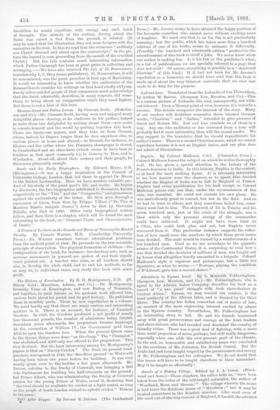Dupleix. By Colonel Malleson, C.S.I. (Clarendon Press.)— Colonel Malleson knows
the subject on which he writes thoroughly well. He has given a special attention to the history of the French dominion in India. In this history, Dupleix is the central, or at least the most striking figure. It is intensely interesting- to see how narrow were the chances, so to speak, that decided. whether the Empire of India was to fall to England or France. Dupleix had every qualification for his task except, as Colonel Malleson points out, one that, under the circumstances of the case, was essential. He could not execute his own plans. He was marvelously great in council, but not in the field. And so• he had to trust to others, and they sometimes failed him, some- times were lost to him. The shipwreck of De la Touche and his seven hundred men, just at the crisis of the struggle, was a. blow which only the personal energy of the commander could have retrieved, It might not have been fatal to a Clive, who could both plan and act, but Dupleix never recovered from it. This particular instance suggests the reflec- tion of how small were the numbers by which these great issues were decided. The scale would be turned by a reinforcement of a few hundred men. Used as we are nowadays to the gigantic armies of the Continental States, it is surprising to road bow a. war that decided the destinies of millions of mon, was fought out by forces that altogether hardly amounted to a brigade. Colonel. Malleson's style is vigorous and picturesque, but a little too• figurative, as when he writes :—" Fortune, pitying the condition of D'Auteuil, gave him a second. chance."


































 Previous page
Previous page